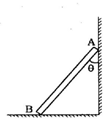(一)
十七大报告指出:我们必须适应国内外形势的新变化,顺应各族人民过上更好生活的新期待,把握经济社会发展趋势和规律,坚持中国特色社会主义经济建设、政治建设、文化建设、社会建设的基本目标和基本政策构成的基本纲领,在十六大确立的全面建设小康社会目标的基础上对我国发展提出新的更高要求。
(1)增强发展协调性,努力实现经济又好又快发展。
(2)扩大社会主义民主,更好保障人民权益和社会公平正义。
(3)加强文化建设,明显提高全民族文明素质。
(4)加快发展社会事业,全面改善人民生活。
(5)建设生态文明,基本形成节约能源资源和保护生态环境的产业结构、增长方式、消费模式。
到2020年全面建设小康社会目标实现之时,我国将成为( )。
A.各方面制度更加完善的国家
B.人民非常富裕,没有贫困人口的国家
C.社会更加充满活力而又安定团结的国家
D.对外更加开放、更加具有亲和力、为人类文明作出更大贡献的国家
参考答案:A,C,D
解析:到2020年全面建设小康社会目标实现之时,我们这个历史悠久的文明古国和发展中的社会主义大国,将成为工业化基本实现、综合国力显著增强、国内市场总体规模位居世界前列的国家,成为人民富裕程度普遍提高、生活质量明显改善、生态环境良好的国家,成为人民享有更加充分民主权利、具有更高文明素质和精神追求的国家,成为各方面制度更加完善、社会更加充满活力而又安定团结的国家,成为对外更加开放、更加具有亲和力、为人类文明怍出更大贡献的国家。

 mgtgθ
mgtgθ mgsinθ
mgsinθ